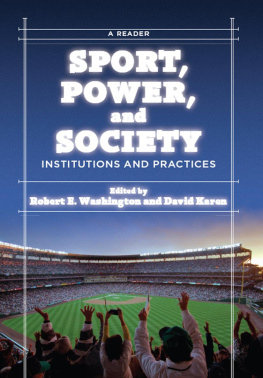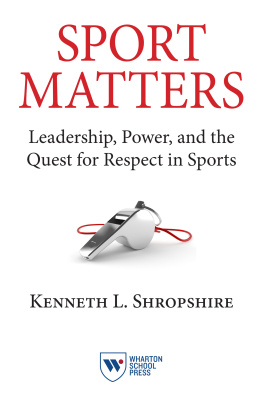Sport, Power; and Society
Sport, Power, and Society
INSTITUTIONS AND PRACTICES
A Reader
Robert E. Washington
and David Karen
Bryn Mawr College
First published 2010 by Westview Press
Published 2018 by Routledge
711 Third Avenue, New York, NY 10017, USA
2 Park Square, Milton Park, Abingdon, Oxon OX14 4RN
Routledge is an imprint of the Taylor & Francis Group, an informa business
Copyright 2010 Taylor & Francis
All rights reserved. No part of this book may be reprinted or reproduced or utilised in any form or by any electronic, mechanical, or other means, now known or hereafter invented, including photocopying and recording, or in any information storage or retrieval system, without permission in writing from the publishers.
Notice:
Product or corporate names may be trademarks or registered trademarks, and are used only for identification and explanation without intent to infringe.
Every effort has been made to secure required permission to use all text and art included in this volume.
Library of Congress Cataloging-in-Publication Data
Sport, power, and society : institutions and practices : a reader / Robert E. Washington and David Karen.
p. cm.
Includes bibliographical references and index.
ISBN 978-0-8133-4487-4 (alk. paper)
1. SportsSocial aspects. I. Washington, Robert E., 1941 II. Karen, David. GV706.5.S7358 2010
306.483dc22
2009054050
ISBN 13: 978-0-8133-4487-4 (pbk)
CONTENTS
Kevin J. Delaney and Rick Eckstein
Andrew Zimbalist
David Morris and Daniel Kraker
Brian OKeefe and Julie Schlosser
Bill Pennington
David Rowe
Murray Phillips and Brett Hutchins
Alan Law,Jean Harvey, and Stuart Kemp
Welch Suggs
Stuart Elliott
John Cheslock
James L. Shulman and William G. Bowen
Tamela McNulty Eitle and David Eitle
Douglas Foley
Teddy Kider
Kelly Candaele and Peter Dreier
Ben Carrington
Carl Stempel
Helen Jefferson Lenskyj
Leslie Ray
Dave Zirin
Nick Trujillo and Bob Krizek
Richard Wright
Richard Giulianotti
Sherri Grasmuck
Lee Jenkins and Michael Schmidt
Molly George
Loc Wacquant
Ian McDonald
Jer Longman
Michael A. Messner
John Schneider and D. Stanley Eitzen
Randall Collins
Robert Lipsyte
During the course of putting this book together, we have accumulated a number of debts. The students who have taken our Sport and Society class have been instrumental in teaching us which readings were most analytically and pedagogically useful. Quite a few students worked with us as research assistants and organizational wizards in the course of collecting the many articles that we have included (and that we have not included!) here. Among them, we would like especially to mention: Steve Feder, Emily Schneider-Krzys, Sasha Toten, and Amy Scott. A number of scholars have helped us arrange free or reduced permissions fees: thanks to Michael Messner, Loc Wacquant, and Rick Eckstein and Kevin Delaney. John Cheslock was very helpful in working with us on editing his Womens Sports Foundation piece. We would especially like to thank Randall Collins and Sherri Grasmuck for contributing original articles to this volume; we very much appreciate the extra care and time they took in producing these pieces. Andy Markovits and Jerry Karabel provided many, many kinds of support throughout this process and we are grateful. Karen Sulpizio once again helped in myriad ways, especially providing important secretarial and bibliographic support at key moments. We would like to thank Fred Courtright for his steady hand in guiding us through the permissions process. The Bryn Mawr College Provosts Office contributed in various ways to help defray the costs associated with this book. Alex Masulis at Westview Press has been a pleasure to work with and we thank him for his support throughout this process. Finally, each of us has accumulated some personal debts. Karen would like to thank his family for always letting him have the sports section first and for tolerating his long stints in front of the computer. Washington would like to thank Rose for her support and sense of humor throughout the summers and holiday breaks when his free time was consumed working on this book.
We developed the format for this book after teaching a Sport and Society course for many years. The general introduction sets out our vision of the uniqueness of sport as a social institution and discusses the ways that it articulates with many other social practices and institutions.
We divide the book into seven parts. Each part focuses on a given social institution or practice and presents several scholarly articles and one journalistic article to illustrate some of the key issues in that domain. Each part begins with a short introduction that details key analytical and/or theoretical issues regarding the given social institution (politics, media, political economy, fandom/community, and education) or social practice (violence, body culture). We demonstrate not only the ways that interactions with these social institutions or practices shape sport, but also how sport, in part through its enormous popularity, influences those social institutions or practices. We then discuss how each of the scholarly articles illuminates the issues we raise in the introductions. Finally, each part ends with a journalistic article that highlights a range of problems about the complex role of sport in modern society.
ROBERT E. WASHINGTON
DAVID KAREN
The year nears its end and the Gigantico Corporation, a major furniture manufacturer, will soon issue its annual report. In the first three quarters, profits showed significant improvements compared to those of last year. But what will the final two crucial weeks of the fourth quarter reveal? Will the company realize the highest profit margin of any furniture company this year? Or ever? How many people in the general public can (or will want to) observe the actual daily performances of this company coming down the stretch? Which employee is expected to be the most valuable employee? Who will rise heroically to the challenge and lead the company to a record-shattering year-end success? Will that employee be publicly acclaimed and adored like a Joe DiMaggio or a Michael Jordan? Will he or she become a national celebrity? Will magazines and newspapers clamor to interview her or him? Will s/he be able to go to a restaurant without being swarmed by autograph seekers? Needless to say, this would be ludicrous in the furniture industryor, indeed, in the world of business more generally.
Yet it is business-as-usual in the world of professional sportspopulated, it should be noted, by large corporationswhich issues frequent, if not daily, reports to a curious public noting the relative value of employees (via rosters and depth charts on team websites) and providing long-term statistical summaries of individual and group performances. And if these data are insufficient, the public can gain further insight into the quality of the individual and group performances by taping and analyzing telecasts of the contests.
Many institutions claim to operate according to meritocratic norms. In fact, in open democratic societies, the entire social order is legitimated according to meritocratic precepts: the notion that rewards are allocated in proportion to









